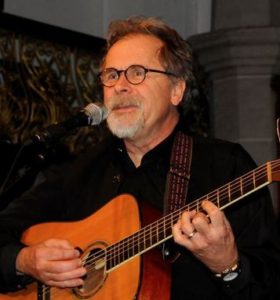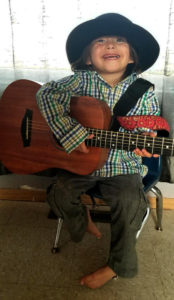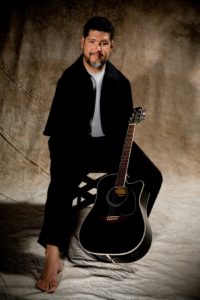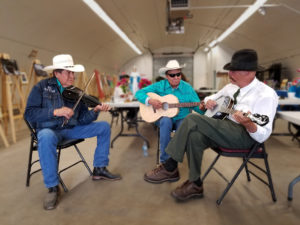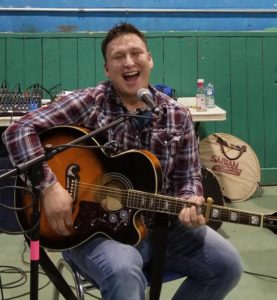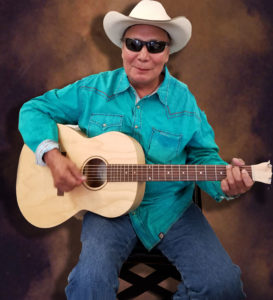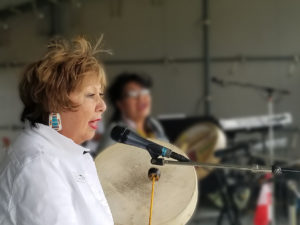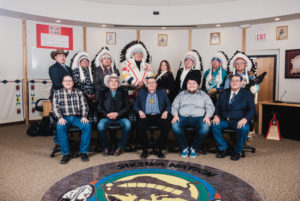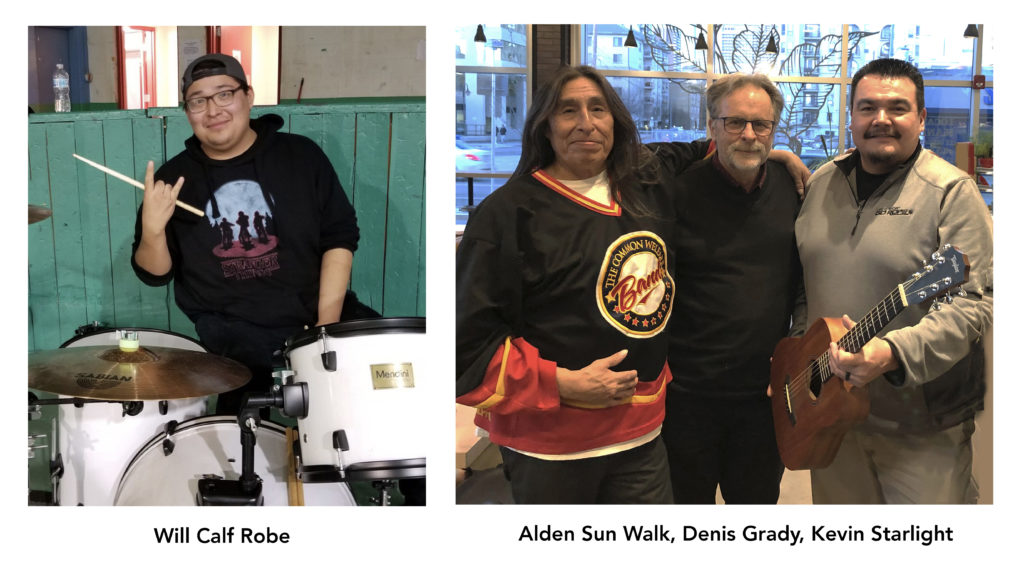“Every great dream begins with a dreamer.”
-Harriet Tubman
When Denis Grady and Smokey Many Guns were invited by Chief Joseph Weasel Child and the Siksika Nation Council to make a presentation about their ‘big idea’, the two friends were pretty excited. They had a PowerPoint presentation ready to go, explaining a new project that they hoped would help develop the gift of music and encourage personal growth among members of the Siksika community.
The Siksika Nation is an hour’s drive east of Calgary, through rolling prairie lands and a skyline that stretches unbroken as far as the eye can see. With a total population of about 7500 members, the Siksika Nation is part of the Blackfoot Confederacy – and the northernmost nation of the Niitsitapi (Original People), all of whom speak dialects of Blackfoot.
Denis Grady, a Third Order Franciscan, is an award-winning country/gospel songwriter and performer who founded the non-profit organization Franciscan and Friends Music Mission. In 2005, the Roman Catholic Dioceses of Trinidad and Barbados invited Grady to the Caribbean, 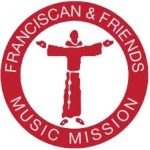 where he and a few musical friends staged a series of benefit concerts and ministry visits to prisons, drug and alcohol rehab facilities, orphanages, seniors’ homes, schools and impoverished neighbourhoods. Grady continued to organize similar musical mission retreats to the Caribbean and Central America for many years through his non-profit organization, impacting many lives in these countries. The trips have also been life-changing for the musicians and other volunteers who accompanied Grady – though they entailed a lot of hard work and financial sacrifice for Grady and his wife Barbie.
where he and a few musical friends staged a series of benefit concerts and ministry visits to prisons, drug and alcohol rehab facilities, orphanages, seniors’ homes, schools and impoverished neighbourhoods. Grady continued to organize similar musical mission retreats to the Caribbean and Central America for many years through his non-profit organization, impacting many lives in these countries. The trips have also been life-changing for the musicians and other volunteers who accompanied Grady – though they entailed a lot of hard work and financial sacrifice for Grady and his wife Barbie.
For the past several years, Grady has felt drawn to make music and new friends among Canada’s Indigenous people. He became involved in setting up music events with members of the Siksika Nation, both in Calgary and in their own community.
Last Christmas Grady spearheaded a Christmas party with live music, donations of over 100 turkey dinners and gifts for Siksika families, and even a visit from Santa Claus. He became more and more impressed by the burgeoning talent for music, writing, filmmaking and art among many in the Siksika community, and wished he could do more to help them.
The idea of developing a specific project to help Indigenous musicians arose over coffee with old friends one morning in Calgary. Guitarist/singer/songwriter Tony Melendez was in town to perform at a number of venues, and he and his brother Jose (who is also his manager) joined Grady at a coffee shop. Tony Melendez, originally from Nicaragua but now living in Missouri, was born without arms after his mother was prescribed thalidomide during her pregnancy. He taught himself to play the guitar with his toes, and now travels the world as a popular and very talented performer. After Melendez listened to Grady’s stories about the budding musicians in the Siksika Nation, he proposed a way to help them – namely, to hold a series of talent contests loosely based on “America’s Got Talent”. Melendez suggested that it would give participants a new way to focus on their musical skills, while giving them valuable experience performing in front of others. The more Grady and his friends talked about the idea while sipping their coffee, the more excited they got.
From his 40 years in the music industry, Grady has a solid network of friends and fans whom he knew he could call upon for help with the project. In short order, he had a great lineup of mentors, including gifted musicians, producers, technicians, promoters, and business people. A longtime friend anonymously gave a donation toward the cash prizes.
The Franciscan and Friends ‘Indigenous People Have Talent’ project was born. Its original goal was to mentor and showcase the talents of members of the Siksika Nation, but it soon grew to include aspiring musicians from the nearby Tsuut’ina Nation as well. After an interview process, participants would be chosen who are interested in music performance, technical areas, management and/or publicity. They would then be teamed up with professionals in the music industry who would serve as their mentors. These mentors would include performers, sound engineers, producers and promoters.
As Grady began initial planning with members of the Siksika Nation, the project began to get serious traction within a few months. He uncovered eager potential participants, church leaders ready to host meetings, grandparents wanting to provide meals, volunteers offering to help coordinate efforts, and even ‘roadies’ hankering to help set up equipment behind the scenes.
After many discussions the project plans took shape. Two initial talent contests at the Siksika and Tsuut’ina Nations would determine which ten participants would be selected to go ahead to the finals. There were also to be a number of live concerts in the communities along the way, to give participants experience in performing.
The final contest was be streamed live and performed before an audience. All of the performers will get a recording of their performance, and the top performers would receive cash prizes.
Finalists will then prepare to take part in a concert tour in the US, led by Grady and his team of professionals.
Grady wondered where he would get the finances to stage this huge undertaking, but his deep faith in God’s provision gave him confidence and courage. Soon, to the astonishment of everyone but Grady, the money appeared. A government body that had been approached was very excited about the idea – and were ready to help fund the project. The only thing left was getting buy-in from the Chief and Council.
One of the most valuable and supportive volunteers in the project is Smokey Many Guns, a quiet man who is always ready to help kickstart new initiatives in his community. Though Many Guns usually works behind the scenes, he is highly respected in the Siksika Nation. He has been a stalwart friend to many families after the devastating floods in 2013, helping them clean up, resettle and move ahead with their lives.
Plus, Many Guns can play a mean guitar.
When the Chief asked Grady to come out to the Siksika Nation one morning to meet with the Council, Grady jumped into his SUV, sped out to the Siksika community, picked up Many Guns and hustled over to the Council office. Fortunately, he felt ready, with his beautiful PowerPoint presentation. The Franciscan and Friends ‘Indigenous People Have Talent’ project had by this time evolved into a one-year employment program to train 25 First Nations participants, connect them to experienced mentors in the music industry, and help them break into the field. They would take part in classes, workshops and practice sessions, and with the added support of elders from their community, look deeply at their life path.
But as Grady stood before the Siksika Council that morning, all these plans were still a dream. He carefully explained the details of the project, as the Chief and Council members sat quietly and listened. Then Grady stopped, and asked if there were any questions. No one said a word, and the silence seemed to last forever. Grady wondered nervously if the whole project was over before it had even begun.
Smokey Many Guns slowly rose to his feet and started talking to the Council in Blackfoot. Grady had never seen Smokey speak in public before – never mind speaking in the Blackfoot language.
As Many Guns’s voice became more impassioned, Grady realized that whatever he was saying was having a powerful effect. At one point, the Chief and Council members switched their gaze and looked intently at Grady.
“What is Smokey saying about me?” Grady thought, his anxiety rising. It was the longest five minutes of his life.
Then the Chief and Council began talking to each other, and asking questions of Many Guns – all in Blackfoot.
Suddenly Grady noticed that the Chief and Council members were silent again, but this time they were sporting huge grins. As they all rose from their chairs, the Chief came over to Grady and Many Guns, and gave each of them a big hug. It was at this point that Many Guns explained to Grady that the project would be welcomed in their community.
Grady got a letter of support from the Council, which triggered the government funding to start the project. As of March 1, 2019, the adventure officially began. Grady, along with many eager volunteers in the music industry and supportive elders from the Siksika and Tsuut’ina Nations, are gearing up to mentor and lend their expertise to project participants. All are excited about building new bridges, expanding potential, and transforming lives. To quote Stevie Wonder, “Music is a language we all understand.”
Photos courtesy of Denis Grady.


